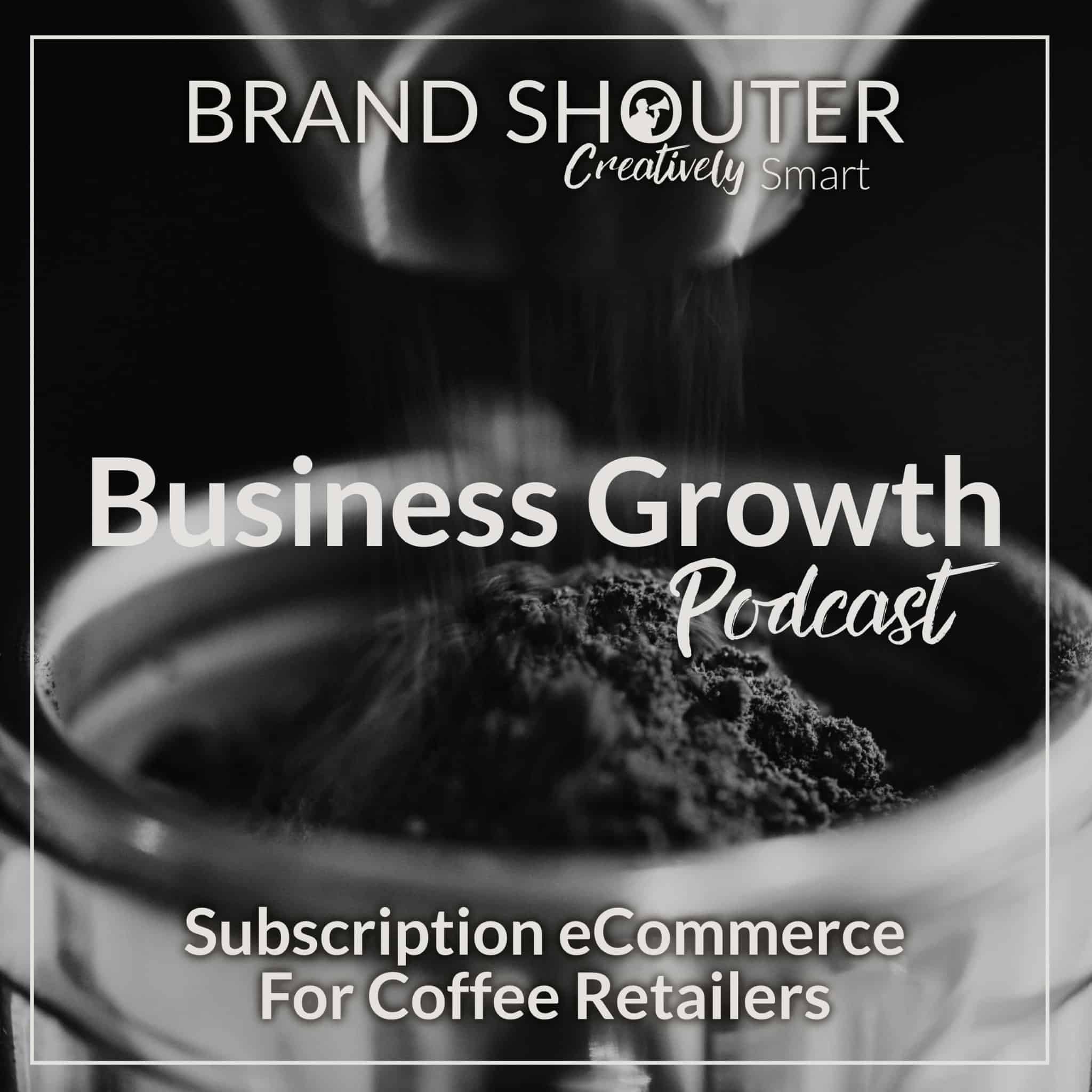This article & podcast, Subscription eCommerce for Coffee Roasters, is a highly focused discussion on why coffee retailers need subscription eCommerce. The overall theme and information contained below are applicable to many businesses, however.
I launched my marketing career through the coffee roasting industry and use that experience to show why coffee retailers (and a lot of business owners in general) should look to a subscription eCommerce model to grow.
WHY COFFEE RETAILERS NEED SUBSCRIPTION SALES
Background
I run a marketing company, however, I began my marketing career while working for a coffee company. Coffee is a highly competitive and process-specific business. Over the course of 13 years, I gained valuable skills: how to run a business, how to manage people, and how to build systems. Marketing was a necessary skill set to acquire in successfully running a subscription eCommerce coffee company.

Single Sales & MRR
It’s important to note that, when we’re talking subscription sales within the coffee industry, there are two types of sales: single sales and MRR. Single sales are when a consumer buys a pound of coffee or a cup of coffee through a stand or drive-thru. MRR is Monthly Recurring Revenue, which is often found through a subscription eCommerce model.
We launched our subscription coffee service after watching Gevalia do it for quite some time. Our research had shown that few coffee companies were even trying to compete with Gevalia and there was a lot of improvement that could be made on their business model.
Coffee consumers tend to buy a pound of coffee at a time when they needed it and from wherever it was most convenient; their local grocery store, a stand, a storefront, etc. There is very little brand loyalty to any brand outside of some of the bigger names. This is similar to the microbrew industry. Consumers enjoy tasting and appreciating new microbrews rather than a single brand.
PROS AND CONS OF SUBSCRIPTION ECOMMERCE
Let’s Start With Some Cons
Subscription-based businesses require more customer service. With increased shipping, there is a greater likelihood of shipping errors between the USPS, FedEx or UPS. Likely scenarios might be a wrong order or confusion over what was ordered requiring customer service to attend to customer needs and concerns while rectifying any mistakes made. This is amplified because that same consumer is now getting monthly shipments.

For us, our customer service team provided explanations to consumers on how the basics of a subscription service worked; customers would call customer support upset that they were receiving a subscription when they only wanted 1 pound of coffee. (The language on the website explained that signing up for our membership program meant recurring coffee shipments at a discounted rate than retail.) Should you choose to engage a subscription sale model for your business, know that this is most likely going to happen; consumers will try and beat the system by signing up for a subscription to receive the discounted rate and then want to cancel after receiving the benefit. This could result in negative customer experiences.
Now the goal is obviously to eliminate negative experiences all together by constantly working to ensure that consumers understand what they are signing up for. Avoid manipulating consumers into subscriptions. Some businesses do this in their small print. Our company took the “small print” and made it large and clearly presented removing as much confusion as we could and reducing negative customer experiences.
Here Are The Pros
When you have a subscription eCommerce business, whether it’s coffee or another product, you are creating a recurring revenue stream. This leads to new customer acquisition.
Let’s use a marketing company for a moment to highlight the pros of recurring revenue. Wapiti is a marketing company that creates recurring revenue through client projects. Often, we provide a smaller upfront price for initial work with a year-long contract retaining a client justifying the cost of offering the initial service at a lower rate. Keeping the client on a month-to-month or year-to-year basis at the same price beyond the first year contract conveys to the client support and future provision of services. This results in benefits to the client and low customer overturn for Wapiti.
Another pro is the marketing value of more of your products being sold. Going back to the coffee industry, selling a pound of coffee also comes with intrinsic marketing value. A consumer who has bought a pound of beans will take it home, set it on the counter and potentially offer it to guests in their home. A possible conversation will occur similar to this: “This is great coffee. What brand is it?” “Oh, it’s…. (insert company name here.)” That’s marketing value. This is word of mouth marketing and it is one of the best types of marketing you can get because it is someone trying your product, loving it, and sharing it with others.

When you sell a single bag of coffee you get a bit of that potential for word of mouth to occur. When someone is on a subscription and a shipment arrives of their coffee selection, that marketing value is exponentially built because they will have that coffee available continuously. Added to this is the potential that guests, friends, or even neighbors will see the shipment box and notice it yet again. Using this model there is an increased likelihood for the marketing value to rise without an increased cost to your marketing strategy.
Having subscription eCommerce for coffee provides ongoing multiple touches with clients. This is a pro in any business. When you go to a subscription business, you naturally begin to retain customers by default. The old adage, “it’s easier to keep an existing client than to bring in a new one” is in full effect with a well-running eCommerce business. Yes, they can cancel their subscription at any time, causing a loss of a client, however, client’s do not stay forever anyway. If you are providing customers with a satisfying experience and product, your turnover rate will be low and your ongoing multiple touches with clients will increase. Your business will grow through this increase in marketing value.

Another pro to the subscription eCommerce for coffee is you have the ability to wow clients by including extras and personal notes. You can do this with single purchases, however, it can be hit and miss. When a consumer is on a recurring shipment and a system is in place to tell the company that this particular client is on shipment number six or is coming up on their one year subscription anniversary, you have the ability to include a little note: “Hey Bob, you’ve been with us for a year now. We want to thank you for your loyalty to our brand. As a
Let’s round out the pros of subscription eCommerce with this: you can raise your retail price. People averse to subscription services that really want your product will pay more to avoid the subscription. It will also build the value of your subscription business. For example, our company offered a low price for the quality of coffee compared to other companies in the industry. While other companies charged $20 for a 12-ounce bag of beans, our retail price was $18 for 16 ounces. Our subscription price ranged from $15 a pound to $12.50, substantial savings over retail price. This builds the value in the club without devaluing the product.
TOOLS OF THE TRADE
PRE-BUILT SYSTEMS MAKE YOUR LIFE EASIER
While there are many tools out there that compliment the subscription sales model, WordPress is our bread and butter for systems and for websites. WordPress has an e-commerce system called WooCommerce. WooCommerce is one of the largest eCommerce systems in the world and you can extend it’s already great functionality with a subscriptions plug-in. I do recommend getting an expert to help you set this up but If you’re a do-it-yourself person that has time to learn on your own, this is the best path to go down.
Shopify has some good subscription features, however, it also has some limitations that require custom integrations. WooCommerce is more accepting of the processes a demanding coffee subscription business would want from their eCommerce platform.
A credit card processing system has to support recurring payments. Stripe is my personal favorite. My experience with authorize.net and their Customer Information Management system was good as they keep information safe and are PCI Compliant, but it was quite a bit more expensive than Stripe which is also PCI compliant and just as safe.

On the other end of the spectrum is shipping. Prior to shipping, you want to make sure that your packaging is up to company and brand standards. If you have the budget, buy the kind of packaging that makes your product stand out. When it’s time to ship, I recommend ShipStation. ShipStation is a standalone system, but can be integrated with WooCommerce subscription services enabling you to quickly ship products out to your clients. ShipStation will also help you find the best rates. You can ship UPS, FedEx, USPS or DHL. You can compare rates if you want or you can set up some logic to where it helps you find the right price.
CONCLUSION – GET EXPERT HELP
The absolute biggest lesson that I learned from establishing a subscription eCommerce business with coffee is this: get an expert to help ensure things go smoothly in the setup process. If you don’t have someone with experience in this process, you may end up wasting time & money (in our case, a lot) and cause negative customer experiences.
Make sure the expert you choose has a data migration plan and plenty of experience in this. This is important if your business is already established with a current client base. Think through details such as data warehousing or streamlining your website for conversion.
An expert will help you iron out all those pesky details so you can focus on what is most important to your coffee retailing business – growth.








